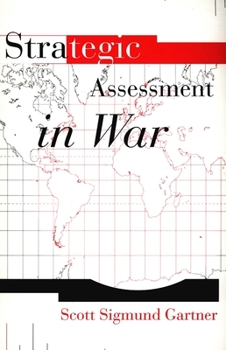Strategic Assessment in War
Select Format
Select Condition 
Book Overview
How do military organizations assess strategic policy in war? In this book Scott Gartner develops a theory to explain how military and government leaders evaluate wartime performance, how much they change strategies in response to this evaluation, and why they are frequently at odds when discussing the success or failure of strategic performance. Blending history, decision theory, and mathematical modeling, Gartner argues that military personnel...
Format:Paperback
Language:English
ISBN:0300080697
ISBN13:9780300080698
Release Date:September 1999
Publisher:Yale University Press
Length:256 Pages
Weight:0.65 lbs.
Dimensions:0.8" x 5.5" x 8.2"
Customer Reviews
1 rating
An illuminating discussion of straty change
Published by Thriftbooks.com User , 26 years ago
When do states change their operational plans? Under what conditions do they change their military or political strategies? These are the basic questions that Scott Gartner answers in his recent book, Strategic Assessment in War (1997, Yale University Press). Gartner answers these question by developing and testing a model of decision making that fits into the bounded rationality tradition of political science. Rational choice scholars might argue, for instance, that decision makers decide to change directions when their estimates of the expected payoffs from the current strategy are outpaced by one or more alternative strategies. While this deceptively simple answer might appear to solve the problem, in practice, for both scholars and policy makers alike the process of evaluation and information gathering creates an intractable problem. In order to evaluate the success or failure of a single policy, according to the rational choice approach, decision makers would have to search over the realm of many possible alternatives and be able to evaluate the costs and benefits of both the chosen strategy and the alternatives, both at the current moment and for the foreseeable future. Scholars working in the organizational behavior tradition have argued that militaries tend to choose simply those strategies that serve their organizational interests best - typically massive offensive strategies, in the absence of civilian intervention. Gartner and decision-makers realize that neither of these approaches is particularly well suited as a general model of state behavior, especially during times of crisis and war. For example, rather than being short of information needed to evaluate the success or failure of a particular strategy, policy makers typically are deluged with it. In fact, they are awash in so much information that they might as well close up their shops for any other purpose other than information evaluation. In Strategic Assessment, Gartner sweeps this approach aside and opts for a far simply one - one that appears to quite close match reality, at least in the cases he presents. Rather than attempting to conduct exhaustive information searches, Gartner argues that decision makers and their advisors pick and focus on a single indicator (or small set of indicators) of success or failure, what Gartner terms the dominant indicator. By focusing on a single or small number of indicators, decision-makers are able to reduce dramatically the danger of information overload. In doing so, they solve one part of their dilemma, but not the other. The other dilemma is, even with indicator of success or failure in hand, under what conditions to decision makers choose to change strategies? For example, they might choose to change strategy in the face of the first piece of bad news. Alternatively, perhaps they might change when the indicator has not changed for some long period. Gartner argues that decision






